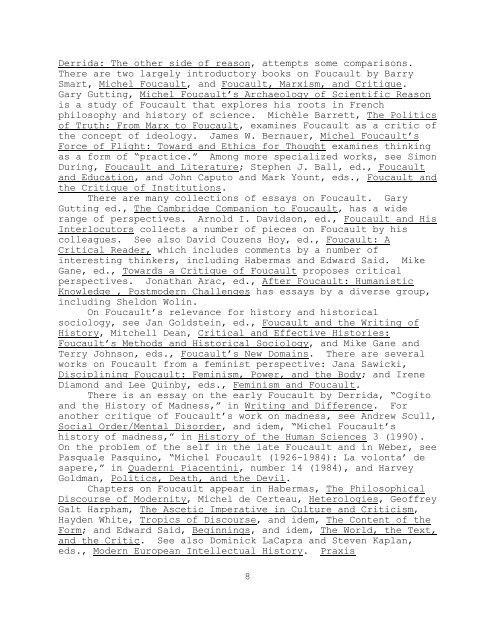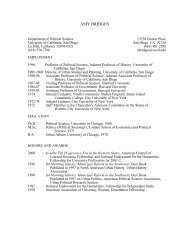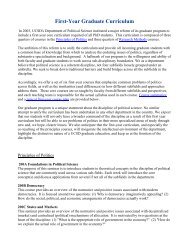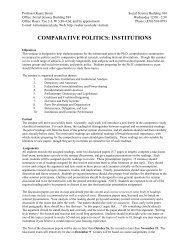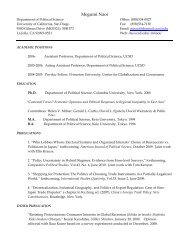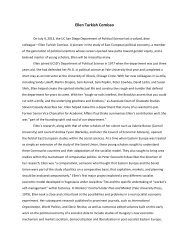Contemporary Sociology Theory - Department of Political Science
Contemporary Sociology Theory - Department of Political Science
Contemporary Sociology Theory - Department of Political Science
Create successful ePaper yourself
Turn your PDF publications into a flip-book with our unique Google optimized e-Paper software.
Derrida: The other side <strong>of</strong> reason, attempts some comparisons.<br />
There are two largely introductory books on Foucault by Barry<br />
Smart, Michel Foucault, and Foucault, Marxism, and Critique.<br />
Gary Gutting, Michel Foucault’s Archaeology <strong>of</strong> Scientific Reason<br />
is a study <strong>of</strong> Foucault that explores his roots in French<br />
philosophy and history <strong>of</strong> science. Michèle Barrett, The Politics<br />
<strong>of</strong> Truth: From Marx to Foucault, examines Foucault as a critic <strong>of</strong><br />
the concept <strong>of</strong> ideology. James W. Bernauer, Michel Foucault’s<br />
Force <strong>of</strong> Flight: Toward and Ethics for Thought examines thinking<br />
as a form <strong>of</strong> “practice.” Among more specialized works, see Simon<br />
During, Foucault and Literature; Stephen J. Ball, ed., Foucault<br />
and Education, and John Caputo and Mark Yount, eds., Foucault and<br />
the Critique <strong>of</strong> Institutions.<br />
There are many collections <strong>of</strong> essays on Foucault. Gary<br />
Gutting ed., The Cambridge Companion to Foucault, has a wide<br />
range <strong>of</strong> perspectives. Arnold I. Davidson, ed., Foucault and His<br />
Interlocutors collects a number <strong>of</strong> pieces on Foucault by his<br />
colleagues. See also David Couzens Hoy, ed., Foucault: A<br />
Critical Reader, which includes comments by a number <strong>of</strong><br />
interesting thinkers, including Habermas and Edward Said. Mike<br />
Gane, ed., Towards a Critique <strong>of</strong> Foucault proposes critical<br />
perspectives. Jonathan Arac, ed., After Foucault: Humanistic<br />
Knowledge , Postmodern Challenges has essays by a diverse group,<br />
including Sheldon Wolin.<br />
On Foucault’s relevance for history and historical<br />
sociology, see Jan Goldstein, ed., Foucault and the Writing <strong>of</strong><br />
History, Mitchell Dean, Critical and Effective Histories:<br />
Foucault’s Methods and Historical <strong>Sociology</strong>, and Mike Gane and<br />
Terry Johnson, eds., Foucault’s New Domains. There are several<br />
works on Foucault from a feminist perspective: Jana Sawicki,<br />
Disciplining Foucault: Feminism, Power, and the Body; and Irene<br />
Diamond and Lee Quinby, eds., Feminism and Foucault.<br />
There is an essay on the early Foucault by Derrida, “Cogito<br />
and the History <strong>of</strong> Madness,” in Writing and Difference. For<br />
another critique <strong>of</strong> Foucault’s work on madness, see Andrew Scull,<br />
Social Order/Mental Disorder, and idem, “Michel Foucault’s<br />
history <strong>of</strong> madness,” in History <strong>of</strong> the Human <strong>Science</strong>s 3 (1990).<br />
On the problem <strong>of</strong> the self in the late Foucault and in Weber, see<br />
Pasquale Pasquino, “Michel Foucault (1926-1984): La volonta’ de<br />
sapere,” in Quaderni Piacentini, number 14 (1984), and Harvey<br />
Goldman, Politics, Death, and the Devil.<br />
Chapters on Foucault appear in Habermas, The Philosophical<br />
Discourse <strong>of</strong> Modernity, Michel de Certeau, Heterologies, Ge<strong>of</strong>frey<br />
Galt Harpham, The Ascetic Imperative in Culture and Criticism,<br />
Hayden White, Tropics <strong>of</strong> Discourse, and idem, The Content <strong>of</strong> the<br />
Form; and Edward Said, Beginnings, and idem, The World, the Text,<br />
and the Critic. See also Dominick LaCapra and Steven Kaplan,<br />
eds., Modern European Intellectual History. Praxis<br />
8


